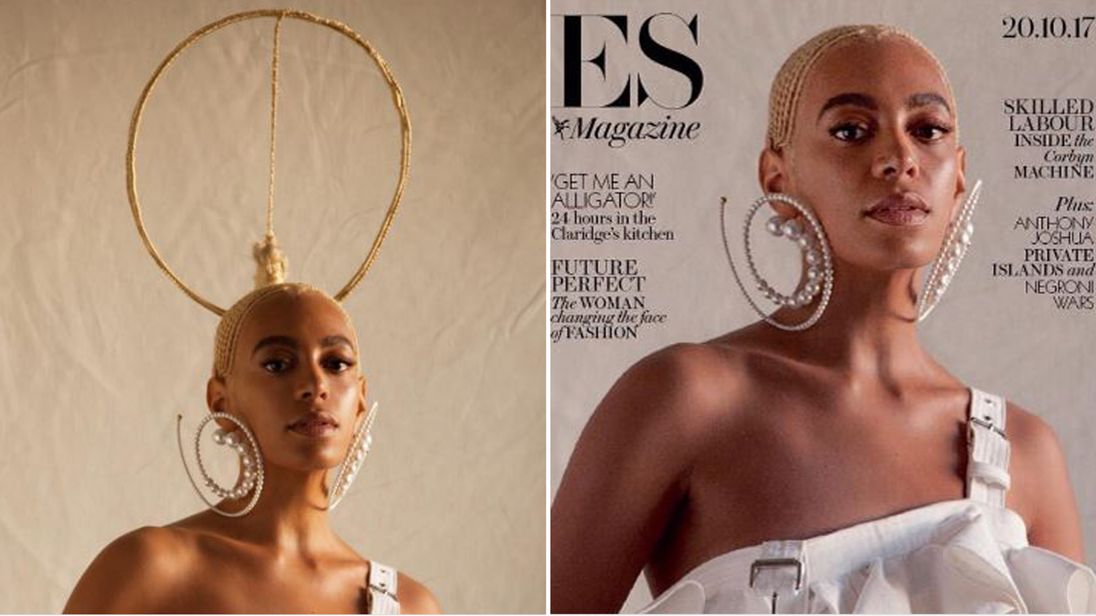The Politics of Black Hair (An African American Opinion)
Black folks have been under an intense magnifying glass for as long as there has been an American culture.
The way we move around the world is constantly judged and criticized, and now, the debate as to whether our lives “matter” has only brought more attention to that judgment.
With so much scrutiny, how are hashtags like #CarefreeBlackGirl and #BlackBoyJoy trending?
Solange Knowles’ most recent studio album, A Seat at the Table, might have given us an answer to that: the politics of black hair.
Encouraging black folks to wear their hair, be it natural or processed, with pride and expression sparked a wildfire in the already blossoming natural hair movement.
Even still, the politics of black hair run deep.
You would think with successful record sales and consistent peaking on the Billboard Hot 100s list Solange would have no further need to protect images of her hair. Wrong.

https://news.sky.com/story/dont-touch-my-hair-singer-solange-knowles-cross-as-hair-touched-11090188
Earlier this year Solange clapped back hard at U.K. based newspaper London Evening Standard for cropping part of her braided crown from their cover photograph. If someone makes a song called “Don’t Touch My Hair,” it’s probably a good idea not to mess with it.
Erasing black identity through “taming” our hair is not cool, and it happens in more cases than you’d think. Even within black hair communities, dichotomies based off curl pattern and length, obsession over Pinterest “hair goals” and the lack of inclusion of all natural hair types and styles still marginalize something that should be exactly what the title suggests: natural.
Black hair is an extension of personality and quite frankly, it is no one’s business but the person growing it.
Still, here are a few kind reminders before engaging in the town hall discussion that is The Politics of Black Hair. Pull up a chair, take some notes, and pay close attention.
All black folks aren’t rocking their natural hair. And here’s why they don’t have to.
Wearing natural hair is not a trend. It’s a decision to revert processed hair to a pre-permanent state, or to just wear your hair as it naturally grows.
No matter if hair is permed or not, it is still “black hair.”
So, it is not polite to bully people into transitioning into their natural state, black or not.
I was 7 years old when I got my first perm, and not given much of a choice. My mother leaned into my terrified face and told me straightened hair would help me be more successful in life. It would be easier.
At the time, she was right. Growing up black and a woman in the 90s, appearance was everything. If you looked clean and put together, you could get ahead in life. Even though I was born the same year Rodney King was brutally attacked by LAPD, my mother had hoped straight hair would help me blend in and make me less of a target for misguided white aggression.
The choice to go natural was one I made because I felt like whether I wanted to or not, I would be involved in the politics of black hair, so I may as well do it the way I liked. I change hairstyles like I do clothes. One day, I’ll be rocking a wash and go, and the next, I might want full and bouncy curls. I like the flexibility of my hair. I like that I can’t 100% control my curls. In a way, it makes me feel like even though my blackness is always on display, there is still some part of me that can’t be assumed or predicted.
So, don’t make assumptions about black folks based on their hair.
A former colleague once told me I was much smarter than I looked.
Naturally, I assumed it was because I am a woman, and I tend to be dainty in presence. I would never have assumed it was because of black hair politics.
My natural hair caused the person I was speaking with to assume I would be “more aggressive” and less eloquent in speech. Although he apologized for his comments, I still felt him policing my body and my personality every time I passed him in the hallway.
As a society, we have become much kinder to men and women who wear their curls in professional settings.
However, blacks folks fight daily to disprove stereotypes of hyper-aggression and hostility.
http://www.totalbeauty.com/content/slideshows/multicultural-style-icons-141006/page9
When my mother grew up, wearing an afro meant rebellion and protest.
Honestly, in some ways, it still does. Being a curly girl is what fits for me, but unfortunately, when the politics of black hair becomes a trend, there is a lot of pressure to fit in, or be left behind.
Black men and women who do not choose to wear their curls are just as supportive of the culture as the rest of us.
About the author: Erika is an African American writer writing for Black Hair Spot. She asks ”What’s your vote on the politics of black hair?” Push more buttons, and check Erika E. Wade’s hot topics on her Twitter account ”



Great article! Just like the songwriter India Arie wrote, “I am not my hair.”
There’s more to me than the eye can see.
Sherry Williams
Birmingham Alabama